It’s been a long time since I left Magic the Gathering, and by now it’s also been a while since I’ve found some great games to scratch the same itch.
This will be a long post, serving as a way to wrap up my time with Magic. I want one place where I’ve gathered my thoughts about the game, and my gripes with it.
A word of warning: this post is mainly written for Magic players (current and former), so if that’s not you then most of this will probably be of little interest to you.
My time with Magic
The first time I played Magic the Gathering must have been in elementary school, about second or third grade. While I remember not understanding almost anything written on the cards, and playing with (what I now know were) ridiculous rules, it was still very enjoyable. It wasn’t a hobby as of then: just a fun game that I played once in a while with a friend.
Despite long periods when I didn’t touch the game, the older I got, the more it grew on me. Somewhere between the release of Darksteel and Fifth Dawn, the game turned into one of my main hobbies and I started pouring in both time, enthusiasm and money into the game. Based on my logged trades on SvenskaMagic, I ended up playing regularly from spring 2004 to spring 2007, took a break, then came back and played from fall 2011 to summer 2012.
The life of a Johnny
I think that since my very first contact with Magic, it was always the deck building that interested me the most about the game. For me, building a deck always started with a fascination for a card or an idea:
- Could I create a combo deck where Horn of Greed is the main engine?
- What about a control deck with almost nothing but lands?
- What cool stuff can I do with Mind over Matter?
- Can I build a deck around Dream Halls?
- How good is a mono black deck with nothing but discard, sacrifice effects and Guiltfeeder?
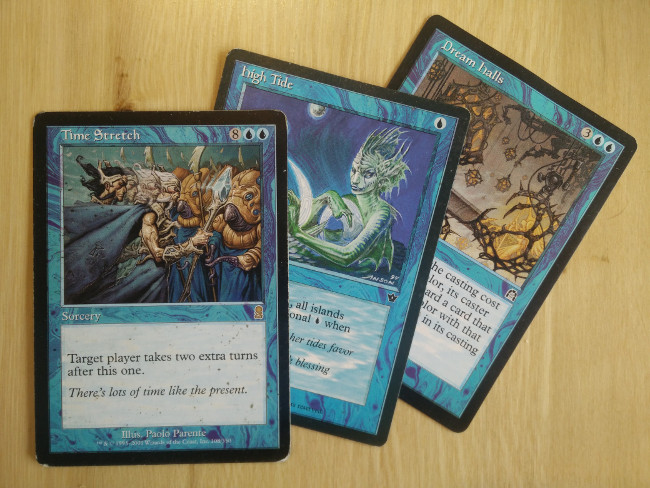 Look at that Time Stretch: it’s seen some play
Look at that Time Stretch: it’s seen some playThese were just a few of the questions that sprung out at me when I was going through the card pool. The ideas could present themselves both as challenges and curiosities, begging to be explored.
Quite quickly, building these decks turned into a medium through which I got to express myself; other decks, players, meta calls and formats served as the constraints within which I was tasked to figure things out. Goldfishing my decks turned out to be something I enjoyed quite a bit.
I was a Johnny. Winning was always nice, but I could gladly take a few loses if that was the cost of playing my deck.
Love and disappointment
Out of all the formats available, T1/T1-Casual (called Vintage these days) was the only one that I felt would work out for me, mainly because it had no card rotation and no banned cards (no, the ante cards and the dexterity cards don’t count). My thought process was that as a kid without a whole lot of money to spend, I wanted my cards to stay legal. I also liked the notion of not being restricted to only play with certain sets: there was so much cool stuff one could build decks with!
So I started in T1-Casual, a format of pure fun where I slowly worked my way toward a greater understanding of deck building and how to play in general. I’m not going to say something like “it was the most fun I had with the game”, but I can say that my ignorance at the time certainly made the game captivating.
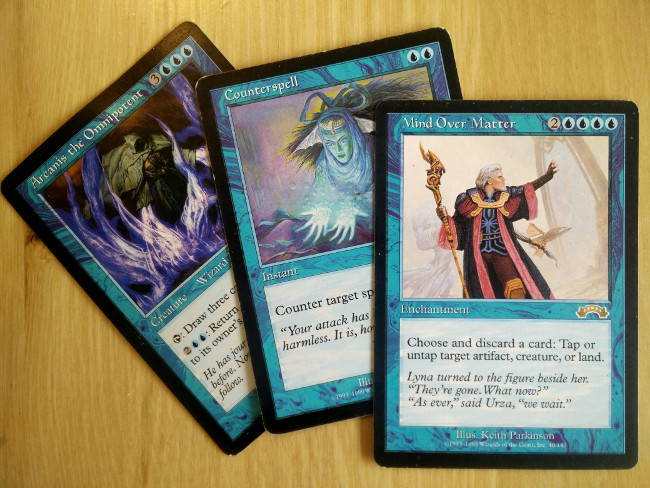 The good old days
The good old daysSlowly but surely, however, I got more serious about the performance of my decks (while keeping them weird), and inevitably this lead me toward getting into Proxy-10-T1.
Proxy-10-T1 was nice because the proxies (fake cards) meant that T1 became a bit more economically feasible, allowing me to get into the more competitive side of the game, while still letting me fiddle around with my offbeat decks I loved to make. I got better and better at optimizing my creations and started to really enjoy drilling my decks with opponents; depending on the deck match-up, there were occasionally some amazing games where I both got to understand my deck better, but also grew as a player. However, it was my time in Proxy-10-T1 (and by extension regular T1 when played on Magic Workstation and Cockatrice) that made me start picking up on the increasingly frustrating parts of the game. I eventually took a break, came back and moved to Legacy (the format had really taken off by then), but unfortunately my gripes with the game were only somewhat lessened in this other format.
The cost
As a CCG, the game was and is a money sink.
The only way to stay on the cheaper side of the game is to be happy with what you get from boosters containing random cards, of which most are terrible. There’s pretty much only one DCI sanctioned format where that’s going to happen and that’s Draft.
In practically every other format (might not be true anymore, I’ve heard there’s a fair number of new formats) you’ll have to rely on the second hand marketplace to obtain the cards you need. Whether it’s a good deck you’re building or one just for fun, you’ll be getting those cards one by one. You’ll get forced into getting a glimpse of what it’s like to be a stamp collector, when you just wanted to play some Magic. Maybe the Collectible part of the CCG abbreviation was exciting once upon a time, but right now I feel that both potential and current Magic players suffer from the legacy of Magic being a game from 1993.
I haven’t even mentioned the fact that the formats range from expensive to insanely expensive. If you happen to feel like getting into one of the formats that make use of those cards that aren’t printed any more, you’ll need to express your will to play with your wallet.
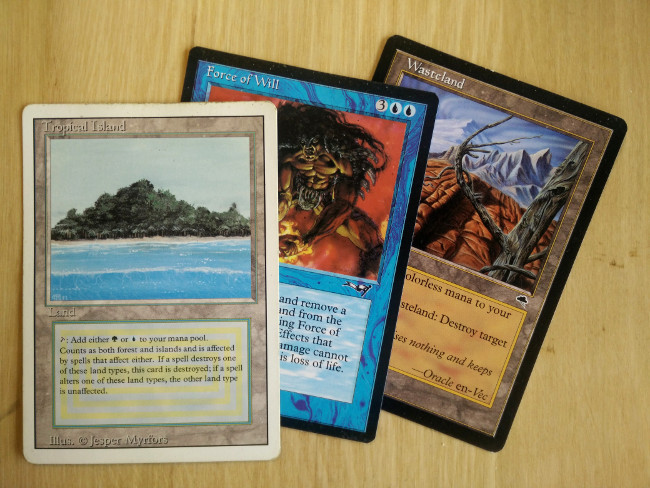 What would you do with about €350?
What would you do with about €350?I remember getting my Tropical Islands from the set “Revised” for about €14 a card (or 130 SEK in my local currency). Today, according to MTGPrice, they go for roughly €221… one of them. This is normal for Dual-Lands, as they’re called, and Tropical Islands aren’t even the most coveted ones, that title belongs to Underground Sea: I got my copies for about €19 a piece, with just one of them costing €360 these days.
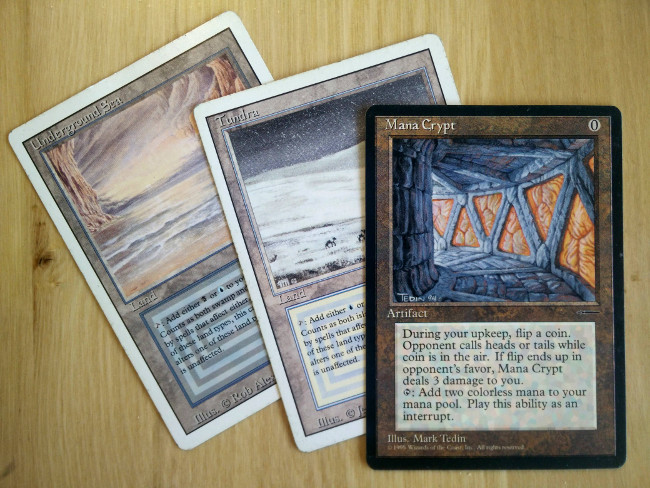 What about €770? Yes, just these three cards.
What about €770? Yes, just these three cards.These are just some of the cards in my collection that have ascended to ludicrous prices. That’s what people getting into a format like Legacy have to combat. I’m not sure Standard or Modern are that much better.
And here’s the thing:
The prices back when I got them were already crazy. To get one card for €15 (a card that you might need four copies of), which constitutes a small part of a 60 card deck is an absolutely terrible value proposition.
And no, while the second hand market is not a part of the business model of Magic, it’s just an inevitable side effect of it: it’s what happens when random boosters are the main product.
Let’s compare this to a more modern model like LCGs:
In Android: Netrunner I’ll buy “datapacks”, which are full playsets of 20 different cards (and you know which ones you get!) for about €11. This has in almost all respects killed the second hand market and is better for the consumer when buying straight from the first hand seller.
While we’re on the subject of what one could buy for just one back-in-the-day Tropical Island, you could get a full deck building game like Star Realms or Epic for about €15. These days, I view that as a much better deal.
With so many excellent alternatives, the price is simply far too steep, but that’s just one of the problems Magic has.
Shitty cards as a necessity through random packs
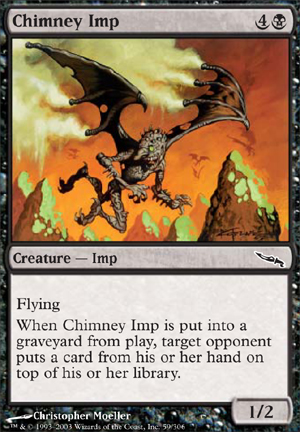 Doesn’t this stuff just make you happy?
Doesn’t this stuff just make you happy?Since Magic is a CCG, card rarity has always been a core part of the game. On top of that, in previously mentioned boosters, there are restrictions ensuring that you couldn’t possibly get too many Uncommon or Rare cards (which tend to be the better ones, but let’s not forget the whole host of CrapRares™ that exist).
This means you have to somehow pad those boosters.
As previously stated, for the Draft format this makes some kind of sense; for everything else it just makes opening a booster more likely to be a depressing experience.
Right, so we’ve taken care of the cards with the new and interesting mechanics, added the vanilla cards that are somewhat boring but balanced and necessary, introduced some cards that power-creep the shit out the game… just one set of cards left now: the really fucking bad cards! Gotta love those!
I don’t doubt that it’s a necessary part of Magic, considering the business revolves around boosters, but since I picked up an LCG it just feels bad. In an LCG, there’s no reason to make terrible cards. Instead, the designers become tasked with exploring new mechanics and card interactions.
Sure, there are terrible cards in LCGs as well, and they don’t come without disappointment, but there’s no inherent reason for them existing. In Magic, if I’ve understood the situation correctly, terrible (and just “somewhat bad”) cards have to exist.
The needless complexity
Magic is old. As mentioned previously, 1993 old.
While the game was certainly revolutionary for its time and paved the way for plenty of other great games, what stands today is a game that has far too much accumulated complexity.
Fun story: the biggest Swedish site dedicated to Magic has a section with a “weekly rule question”. A hypothetical board state is described, maybe some cards are played, and then the reader is presented a few alternatives with possible outcomes, of which only one is correct. Back when I played the game actively I used to test my knowledge on these; more often than not, there was a sizeable chunk of people who answered wrong on the quizzes, often me included. There’s plenty of material to draw from for these questions, considering the comprehensive rules are a 213 page long PDF document.
If Magic was a game that came out in 2016, and one saw that one would be able to have these weekly quizzes for years due to complexity of the rules, it would be considered a COLOSSAL failure in game design.
I won’t blame Magic for being complex, because I’ve seen the same stuff happen to software: if you keep adding feature after feature, year after year, the application will grow in size and complexity… until it bleeds out to the user (or in this case, player). Nonetheless, I will say this:
There are games today that stand out as more elegant, with rules that allow for rich gameplay to emerge, without the redundant complexity that Magic has.
Lore in very small doses
Here’s a thing that bugged me throughout my entire time playing Magic; not a whole lot, but it was always there:
The lore of Magic is not provided to the players in an effective way.
For every block, there was a new theme and story. Apart from those being interesting in themselves, these themes and stories were tied into this grand overarching story related to planeswalkers, in some way. How was this primarily delivered?
Either through flavor text and artwork on cards, or having you go all-out and read the novels.
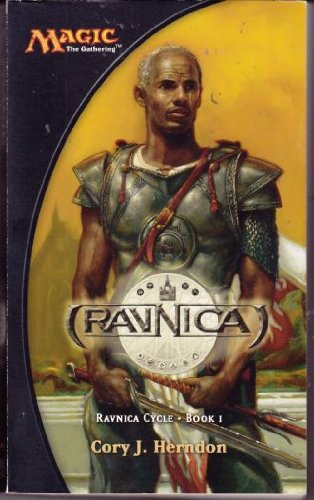 I loved Ravnica, but this book is 320 pages long. Not exactly bite-sized.
I loved Ravnica, but this book is 320 pages long. Not exactly bite-sized.Going through summaries of the lore on Wikipedia or on the MTG Salvation Wiki is possible, but that’s not an official channel. You don’t get lore when you “buy Magic”, which most often means getting a booster.
Compare this to Android: Netrunner:
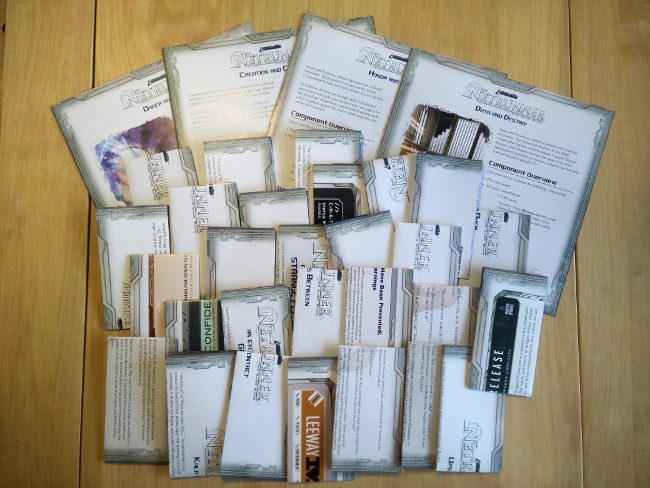 A grand pile of lore.
A grand pile of lore.This is a collection of all the lore inserts I’ve gotten with Datapacks and Deluxe expansions. They tend to contain a bit of rule clarifications, but mostly they’re glimpses into the Android: Netrunner universe. While one mainly buys datapacks for the cards, these inserts contribute greatly to fleshing out the characters and environments that are then shown on the cards. I should also mention that when one buys a Core set, in the rule book (handy concept, by the way) there are a couple of pages dedicated to introducing the reader to the world and the different factions.
I guess Magic once again suffers from the main delivery method of the product: boosters need to stay somewhat cheap, and you can’t slot in too much stuff in there apart from the cards.
However, I will give Wizards credit for their Story Archive, which seems to be a good resource, although somewhat overwhelming. I don’t recall this page existing back in the day.
Moving on
Board and card game design has advanced tremendously over the past years. There are now so many quality products out there that I believe that Magic mostly lives through its clout.
As made obvious by plenty of snippets above, when it comes to card games I’ve moved on to Android: Netrunner, a game that provides me with all that Magic gave me, and then some. With that said, it’s not the only great game I’ve found since I started to explore the world of board and card games. From massive space operas to abstract two player games, for a fraction of what I invested into Magic, I’ve been able to line my shelves with a colorful palette of experiences.
Magic has been an important game for me, and I still have plenty of memories from my time with it. Flipping through my binders when preparing for this blog post was certainly nostalgia inducing, putting a smile on my face.
But that’s just me remembering the good parts, and not the things that made me move on.
